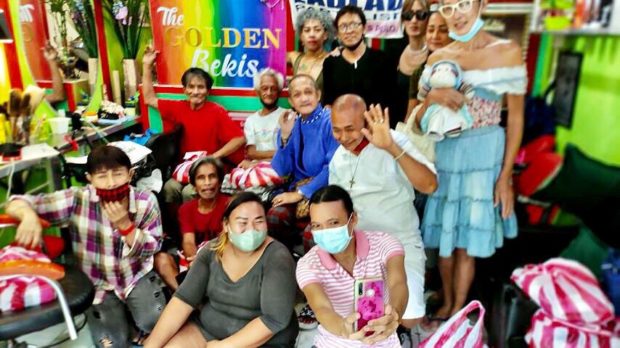
This photo shows Ladlad providing aid to queer, indigent senior group Golden Bekis. Photo taken from Ladlad’s FB Page
MANILA, Philippines — Challenges are nothing new to the LGBTQ+ (Lesbian, Gay, Bisexual, Trans, Queer) community in the country and the Golden Bekis in Parañaque City is no exception with members bravely confronting the troubles of being gay while growing old amid hardships.
Abandoned by their families – which is somewhat common among LGBTQ+s – members of the Golden Bekis are generally living alone and sheltered in a corner of a barangay hall or in a church or in the salon where they are employed, according to group leader Kyle Mendrez.
“Sa kanila po, maswerte na may pamangkin, kapatid, pinsan na kukupkop,” Mendrez told INQUIRER.net through text on Wednesday.
(For them, they are already lucky if they have a nephew, sibling or cousin that would take them in).
“Pero most of them are living alone, maswerte na may matutuluyang apartment na kayang rentahan pero marami po sa kanila kinupkop ng barangay at pinatira sa isang sulok ng barangay hall. Kinupkop ng simbahan. Yung isa po sa parlor na pinagtatrabahuhan na po nakatira”, he added.
(But most of them are living alone. They are lucky if they can afford to rent an apartment but many have been taken in by the barangay and made to live in the corner of a barangay hall. Some were taken in by the church. One lives in the salon they work in).
This photo shows members of the Golden Bekis receiving aid from Ladlad at a salon. Photo taken from Ladlad’s FB Page
Surviving each day was a battle. Members of the Golden Bekis grab various part-time jobs at every chance they get despite its toll on their aging body.
“They have very limited opportunities na po to choose a job due to their age and educational attainment. Kung anu-anong hustles na po ginagawa nila (They have been into different hustles): house-to-house mani-pedi, haircuts, massage, selling by the sidewalk etc. Kumbaga kung ano ‘yung kaya nilang gawin, papasukin pa rin nila po (Whatever work they can do, they will take it so to speak),” Mendrez said.
As a group, he said, they are also trying numerous livelihood projects such as selling bracelets and making soap.
It was in January 2021 when Mendrez thought of forming Golden Bekis after asking friends to refer him to elderly gays.
“’Yun din naman po ‘yung layunin ng grupo namin, na ang mga miyembro magtutulungan at mag-aalalayan, na kung sino ang may sobra ibabahagi at kung sino ang may oras makipag-chikahan ay kakausapin ang mga kapatid,” he said.
(That is our group’s goal, that our members help one another. Whoever has excess can share and whoever has time can talk to the other siblings).
While many of them may have been abandoned by their families, they are not alone in their struggle, Mendrez asserted.
According to Mendrez, the Golden Bekis has been getting support and help from LGBTQ+ organization Ladlad through the “Tabang Ladlad Project.”
Specifically, the Golden Bekis is a recipient of a project where Ladlad distributed food packs to queer, indigent seniors in different barangays in the National Capital Region and Olongapo during the pandemic.
Just recently, Ladlad national secretary Abel Macaldo said they visited the Golden Bekis and promised to look for a livelihood sponsor for them.
“Ito ‘yung mga bakla na noong sa panahon pa na malakas ay tumutulong sa pamilya pero noong tumanda na sila ay parang pabigat na sila sa pamilya. Nakakalungkot,” Macaldo, in another text message, said of the Golden Bekis.
(These are the gays that provided for their families while they were still able-bodied but when they got old, they became something like a burden to their families. It is saddening.)
“’Yung iba po kasi ay pinag-aral ang mga pamangkin o kapatid pero noong tumanda na si bakla ay parang naging pabigat na siya lalo na ‘yung mga wala ng trabaho,” he said.
(Some of them got their nephews/nieces or siblings through school but when they got old, they started weighing their families down, especially if they no longer have a job.)
Screengrab from the Golden Bekis’ YouTube Channel.
Beyond their joint struggles, the Golden Bekis is bonded by a solid friendship that understands one another deeply.
They even have a vlog on YouTube where they share their stories, with topics ranging from expressing their insights and feelings about photos of Old Manila to doing reaction videos.
“I know that they have stories to tell, colors to show, and smiles to share,” Mendrez said.
RELATED STORIES
A quick dive into the history of the LGBTQIA+ community in the Philippines
Dark reality: Gay people struggles persist after coming out
Reclaiming safe spaces for the LGBTQIA+ community